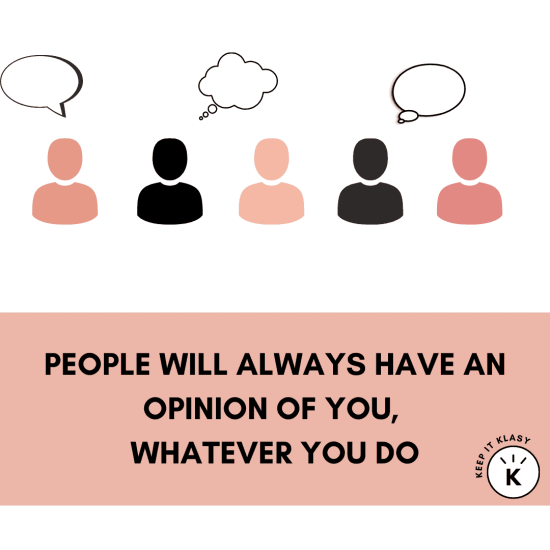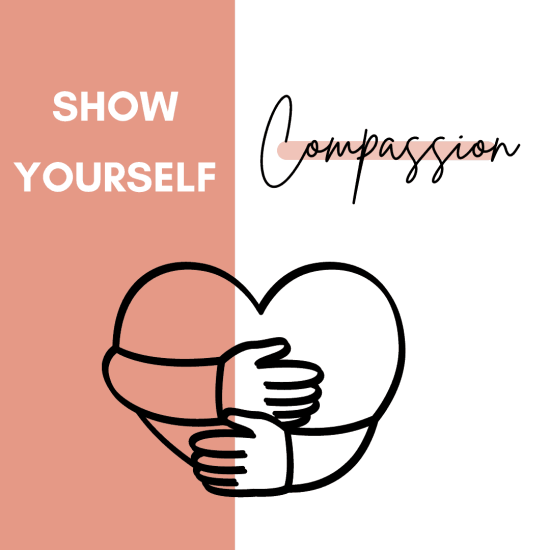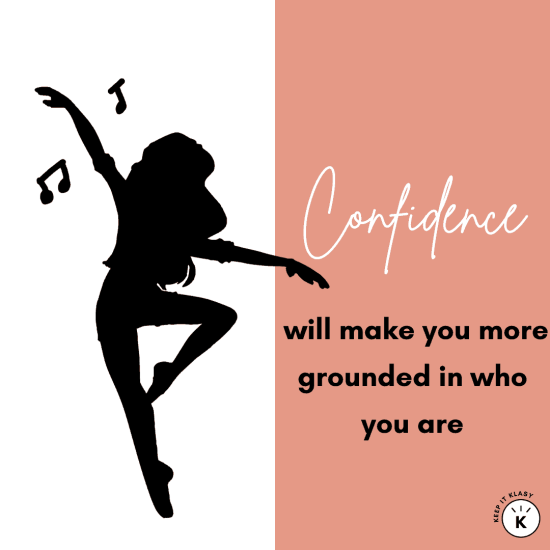
Caring too much about what other people think about you can be detrimental to your self-esteem and mental health. However, stopping those racing thoughts and ruminations is far easier said than done and there is a good evolutionary reason for it which I will explain in this post. But then, how to stop caring about what others think and ensure that those thoughts never stop you from reaching your full potential and going after your dreams?
Disclaimer: This site contains affiliate links to products. We may receive a commission for purchases made through these links. Visit my disclaimer page for more information.
Why do we care what others think?
If it is any consolation, caring what other people think of us is evolutionarily programmed into us – it is an evolutionary adaptation.
In the past being part of a group and being accepted by others was essential to survival. Even though in today’s world our survival does not depend on being part of a group this need has somehow remained part of our instinct and psyche.
But then again, humans remain social animals, and being accepted by others remains important to us.
I wanted to make this point because I think understanding that this instinctual need is only a remnant of an evolutionary adaptation and without acceptance of others our lives are not at stake, can help to shift the mindset and help us overcome the need for others validation of you.

Are you caring too much what others think about you?
Caring too much about what other people think, can stop you from living your life to the fullest, it can make you more inhibited, and less spontaneous as you overthink and overanalyse your every word and action. It can be exhausting and stop you from enjoying your life and building strong relationships.
But how do you know if you are caring too much about what others think about you?
Here are the indicators:
- You allow criticism from other people to change your actions.
- You let other people make decisions for you.
- You are a people pleaser.
- You have difficulty setting boundaries
- You hold your tongue if your opinions differ from those around you.
- Your self-worth relies on approval from others.
- You are apologising even when you did nothing wrong.
- You have difficulty saying no.
- You always play the victim.
- You don’t follow your guts.
- You crave peace and don’t get angry.
- You put yourself last.
- You feel ashamed about things that make you happy and might you up.
- You have a hard time asking for help.
- You try to make everyone like you.
- You take things too personally.
- You consistently evaluate yourself through other people’s eyes.
- You overanalyse everything you do and say.
- You don’t take feedback well.
- You think rejection means you need to change.
- You only feel accomplished when someone praises you.
Does that sound like you? If yes then you might be caring just a little bit too much but now to worry with these tips hopefully you learn to unlearn caring too much about what people think about you.
How to stop caring about what people think and go after all you want?
1. Remind yourself that no one care as much as you think.
As humans, we tend to be very self-centered, which is understandable because we analyse our entire existence from our own experiences. There is a name for this in the psychology domain and it is called “the spotlight effect”. No, it does not mean that we are arrogant or more important, it is an unavoidable phenomenon that occurs because well we spend more time with ourselves, our thoughts, feelings, and emotions, than any other human being on earth. All these thoughts, feelings, and emotions we quickly project as our most trustworthy reality.
If you take a step back and think about a time you had to perform, I bet you were focused on your performance far more than anyone else’s. Well, then trust me that the people you think are judging you, are far more concerned about themselves to spend time analysing you.
People really do not care as much as you think.
2. Expect and accept that people will have opinions of you.

In some instances, people will have opinions about you, whether right or wrong, whether you agree or not, whether well-meaning or not. But it is important to recognise that for every negative opinion of you there will be someone who thinks highly of you. There will be some people who criticise you but others will be absolutely impressed and inspired by you.
You will never be able to please everyone and accepting this truth will set you free. Even more importantly, recognise that peoples’ opinions of you do not define you. A lot of the time we tend to place a lot more weight on the negative comments of people who mean little to us and do not know us very well but place little value on those who do and who think highly of us.
No one likes criticism and you are allowed to be hurt by it but do not take it to heart and do not make it the ultimate truth because it rarely is.
3. Take back control over your own feelings.
Believe the fact that you do have control over your thoughts and feelings. So even if someone is giving you a hard time or doing everything, they can make you feel bad about yourself, then know you do not have to accept it. Instead, show yourself the self-love and compassion you need and feed your mind with positive thoughts about yourself.
By taking control like that, and accepting that you do have control, you will be less likely to be swayed by the opinions of others and you will feel more confident and empowered to live the life you want.
4. Remember that everybody makes mistakes.
Sometimes, we won’t get things perfectly right, and occasionally we will make mistakes. It feels awful at the moment and no matter how confident you are in yourself and how firmly you have your feet grounded, it will shake the ground under your feet and make you question yourself.
But know that making mistakes, failing, and not being perfect is part of human existence and every single person experiences it. That’s why watching someone else going through it feels so relatable.
So allow yourself to be imperfect and accept that at some point you won’t always get everything perfectly right.
5. Forgive yourself and shift your mindset.
Be your own best friends and show yourself as much compassion as you would to someone you love or care about deeply. Sometimes we do the wrong thing, sometimes we say the wrong things, sometimes we upset someone without intending to and sometimes we are not at our best.
In those moments try not to allow yourself to fall into that pity trap and show yourself some compassion.

6. Stop judging others.
The way we talk or think about others often reflects how we think and feel about ourselves. If you find yourself often judging others and being overly critical of others, take a closer look because it is likely that you are using the same kind of language and criticising yourself.
By criticising others and by default being more critical towards yourself, you are programming your mind to find faults in everything and everybody including yourself.
By showing more compassion and being more empathetic and understanding towards others you may stop being so judgmental towards yourself. Therefore, you will spend a lot less time worrying about what other people think of you.
7. Develop your sense of self and build confidence.
The stronger your sense of self, your sense of worth, and your general confidence the less likely that you will be swayed by the opinions of others.
Continually working on your confidence will make you more grounded in who you are, it will make you more forgiving towards yourself and help you keep that sense of confidence no matter what anybody else thinks or says.

8. Don’t try to mind read – you’re most likely wrong.
It has been scientifically proven that nobody is thinking about you as much as you think about yourself.
People tend to fall into a trap of a cognitive bias called ANCHORING where people invoke their own experienced as a guide for inferring the experiences of another person.
Our brain is wired in a way where the default is to think about ourselves so when you feel judged, it’s because you are judging yourself.
Stepping out of this cognitive bias is not easy and takes practice. But knowing what is occurring and understanding that it is your own mind playing a trick on you is the first step. Next time you find yourself in a situation where you are feeling judged.
9. Consider the source – not everyone’s opinion matters.
Remember to be selective of who’s opinion you listen to because not everyone’s opinion should matter to you. There will be plenty of people out in the world who do not have your best intention at heart and will likely have very strong opinions of you that are not representative of you. Other times their opinions may be intended to hurt you and only that.
In a roundabout way, it is these types of toxic people in our lives whose opinion we pay attention to and place the greatest value on. Don’t fall into this trap.
Trust your gut because it will help you filter the toxic people in your life.
10. Know that you’re usually your own worst critic.
When you are overly critical of yourself you are stopping yourself from living your best life and from reaching for all your dreams. That nagging voice in your head that has only negative things to say needs to be silenced.
Your mind will start believing in everything you tell it. If you are critical, over time your brain will start seeing these thoughts as facts rather than just passing thoughts.
The important thing is that just as you taught your mind to be critical, you can teach it to (and re-wire it, literally) start being kind.
Here is where practices such as mindfulness, meditation, journaling, and gratitude can help. Cognitive behavioral therapy (CBT) also works wonders because it helps you to start re-programming the brain.
So, the next time that a negative, self-critical thought starts to surface, challenge it. Write down all the evidence that you have from present and past experiences that counteracts this thought.
Then write down a few positive things about yourself and repeat them until you mean it and believe them.
It takes time but over a period you will start to change your thinking patterns.
11. Know that your value is not contingent on being liked.
There will always be people who do not like you, just as there will be plenty of people who love you. That’s just a fact of life and this is the case for everyone. For that reason, you should never place your inner value on how people precise you and whether someone likes you.
More importantly, you need to like yourself and accept yourself just as you are. Without self-love, you are relying on those external metrics and other people’s opinions to validate you, and this leaves you exposed and vulnerable. Other peoples’ opinions of you should never define your value.
12. Surround yourself with accepting, supportive people.
Surrounding yourself with kind, loving and supportive people that you trust will help you fill more fulfilled, who encourage you and bring out the best in you. Being around good people can impact every aspect of your life.
Avoid the nay-sayers because they will drain your energy, make you doubt yourself and discourage you. More likely than not, because they see your potential and are afraid of you. So let these people go and do not take their opinion of you to heart.
Listen to the loving voices in your life because their opinions are most authentic.
13. Define your values.
Having strong core values that are well defined can help you feel more grounded in who you are and more confident about yourself and your life. When you feel grounded in who you are you will be less affected by others’ opinions of you.
Take some time to write down what those values are for you, thinking back to a time in your life when you felt really good about something, when you felt you made the right choice, and when you felt most confident. Think about what sort of things and qualities you like in other people. All of this will help you get clear on your core values.
If you are looking for a creative outlet while defining what your core values are I recommend using Canva and creating a vision board. Canva is a fantastic online design and publishing tool.
14. Find the core wound and write a new story.
We all go through challenges, and we all face difficulties in our lives at some point. Too often we do not take the time to reflect on those moments and properly process them.
This means that these challenges carry on holding us back because they create core wounds that spill over to many aspects of our lives. Whether straight away or in 5 years’ time, these things have a habit of catching up to us eventually.
Carrying these core wounds can diminish our sense of self and our esteem. When we are not at our best, we are more likely to be influenced by others’ opinions of us which is why it can massively benefit you to take the time and work through your core wounds.
This way you have a clean slate so you can begin writing a new story about who you are. You can step into the person you want to be, paying less attention to what those around you think.
On a Final Note.
SUMMARY: How to stop caring about what others think?
- Remind yourself that no one care as much as you think.
- Expect and accept that people will have opinions of you
- Take back control over your own feelings.
- Remember that everybody makes mistakes.
- Forgive yourself and shift your mind-set
- Stop judging others.
- Develop your sense of self and build confidence.
- Don’t try to mind read – you’re most likely wrong.
- Consider the source – not everyone’s opinion matters.
- Know that you’re usually your own worst critic.
- Know that your value is not contingent on being liked.
- Surround yourself with accepting, supportive people.
- Define your values.
- Find the core wound and write a new story.
